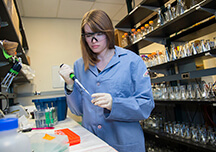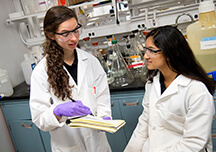3 Purdue students to present their research on Capitol Hill
April 20, 2015
 |
|
Purdue University undergraduate student Nicole Biddinger works in the laboratory of Angeline Lyon, an assistant professor of chemistry and biological sciences. Biddinger is among three Purdue students selected to present their research at the Council on Undergraduate Research's annual Posters on the Hill event in Washington, D.C. (Purdue University photo/Mark Simons) |
WEST LAFAYETTE, Ind. — Three Purdue University undergraduate students will present their research to members of congress and federal funding agencies as part of the Council on Undergraduate Research's annual Posters on the Hill event Wednesday and Thursday (April 22-23) in Washington, D.C.
Nicole Biddinger, a junior studying biological sciences, Jaycey Hardenstein, a junior studying biological engineering, and Alisha Tungare, a senior studying chemical engineering, will participate in the event. Their projects were among a group of 60 selected from approximately 500 applications.
The 19th Annual Posters on the Hill includes a poster session and reception where students present their work and speak about the importance of the undergraduate research experience to representatives from federal funding agencies, foundations, members of Congress and congressional staff.
Biddinger, who is from Bartlesville, Oklahoma, and began participating in research in high school, said a large factor in her decision to come to Purdue was its emphasis on the importance of undergraduate research because the personal and professional growth attained last far beyond the lab bench.
 |
|
Purdue University undergraduate students Jaycey Hardenstein, left, and Alisha Tungare discuss an experiment in Purdue's Laboratory of Renewable Resources Engineering. Hardenstein and Tungare are among three Purdue students selected to present their research at the Council on Undergraduate Research’s annual Posters on the Hill event in Washington, D.C. (Purdue University photo/Mark Simons) |
"In addition to communication and problem-solving skills, my research experiences taught me persistence in the face of failure," she said. "Experiments do not always go as planned, and unforeseen circumstances present opportunities to go back to the drawing board and propose new ideas. Learning to approach problems from different angles is not only applicable in the lab, but also in coursework and in varying leadership positions throughout life. It is vital for funding agencies to support research at this level because those funds are supporting more than just a research project - they are supporting future leaders in their respective fields."
Purdue undergraduate students participate in more than 2,000 research projects each year, said Frank Dooley, Purdue vice provost for teaching and learning.
"Undergraduate student research provides a powerful stage for deep learning by our students, as well as the opportunity to be mentored by our faculty," Dooley said. "Our faculty benefit as young inquisitive minds can bring great energy and fresh perspective to old problems."
Tungare, of Wheaton, Illinois, began participating in the research project when she was a freshman.
"By being a part of this research group I was able to sit in on meetings with funding agency representatives and learn about the bigger picture for research in the field," Tungare said. "This experience has helped me learn skills that are not taught in class, like communicating technical information to different types of audiences. Even if you are not pursuing a career in the STEM disciplines, participating in undergraduate research is a very valuable experience."
Hardenstein, of Beavercreek, Ohio, began participating in the research project when she was a sophomore.
"Participating in research has allowed me to expand on the concepts I've learned in class and apply them to real problems," Hardenstein said. "It also has given me the opportunity to connect with faculty and graduate students to gain valuable insight and advice as I pursue my goals. I'm eager to meet with other students at the Posters on the Hill event and to learn the perspectives of the policymakers and legislators."
Biddinger will present her poster "Using Resurrection Ecology to Understand Changes in Heat Tolerance in a Daphnia Population Over the Last Few Centuries."
The National Science Foundation funded her research, which examines the physiological response of the aquatic invertebrate Daphnia to a warming environment. Daphnia live in lakes and produce resting eggs that can be preserved in sediments for centuries. Researchers can harvest the eggs from different sediment layers, hatch them and compare the organism from different points in time. Biddinger and her research team examined Daphnia from 10-year-old, 60-year-old and 300-year-old eggs, and found that the older generations were more sensitive to heat stress, she said.
Her adviser is Puni Jeyasingh, an associate professor at Oklahoma State University where she completed three summer internships. At Purdue, Biddinger has participated in research in the laboratory of Esteban Fernandez-Juricic, a professor of biological sciences, and is currently working with Angeline Lyon, an assistant professor of chemistry and biological sciences.
Hardenstein and Tungare will jointly present their poster "Enzyme-Assisted Pathogen Detection Applied to a Microfiltration System for Food Safety."
The USDA funded the research, which investigates the effect of an enzyme pretreatment on E. coli cell growth. Their work is a part of a larger project to optimize a device that can quickly detect foodborne pathogens. The device, called a continuous cell concentration device, was developed in Purdue's Laboratory of Renewable Resources Engineering, and has been used to detect E. coli in beef. The device uses microfiltration to produce a smaller, concentrated sample for faster identification of bacteria and other pathogens, Hardenstein said.
Their adviser is Michael Ladisch, a distinguished professor of agricultural and biological engineering and biomedical engineering, and director of Purdue's Laboratory of Renewable Resources Engineering, or LORRE. LORRE scientists Eduardo Ximenes and Xingya Liu also assisted with the project.
The mission of the Council on Undergraduate Research is to support and promote high-quality undergraduate student-faculty collaborative research and scholarship.
The Posters on the Hill event is part of the council's effort to ensure that those in the U.S. Congress have a clear understanding of the research and education programs they fund.
Additional information is available at http://www.cur.org.
Purdue offers many undergraduate research programs and opportunities. More than 220 students participated in a university-wide undergraduate research poster session this week to celebrate national undergraduate research week April 13-17. The poster session was one of several sessions featuring undergraduate research held each year. The university also publishes the Journal of Purdue Undergraduate Research and the Purdue Journal of Service Learning.
Writer: Elizabeth K. Gardner, 765-494-2081, ekgardner@purdue.edu
Sources: Frank Dooley, 765-494-0615, dooleyf@purdue.edu
Nicole Biddinger, nbidding@purdue.edu
Jaycey Hardenstein, jhardens@purdue.edu
Alisha Tungare, atungare@purdue.edu
Related news releases:
http://www.purdue.edu/fivestudents/october-2014/biddinger
http://www.science.purdue.edu/news_and_publications/articles/Nicole-Biddinger.html

